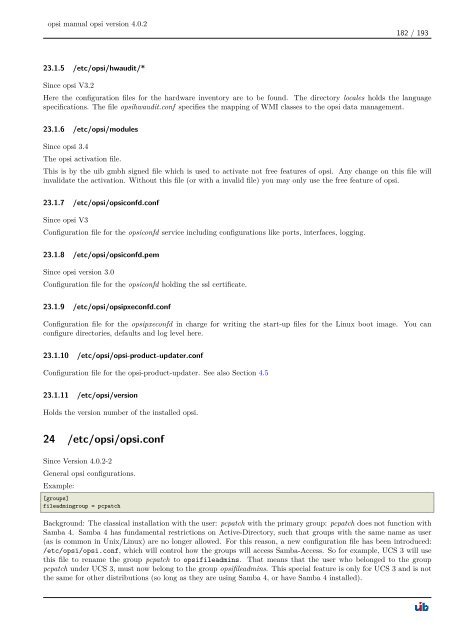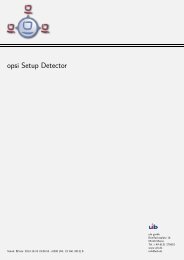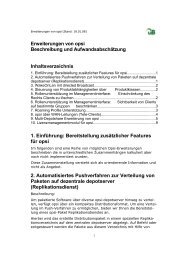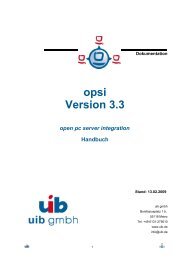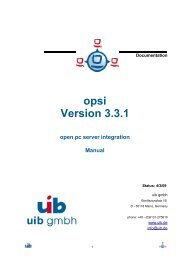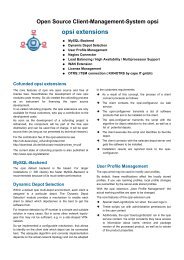opsi manual opsi version 4.0.2 - opsi Download - uib
opsi manual opsi version 4.0.2 - opsi Download - uib
opsi manual opsi version 4.0.2 - opsi Download - uib
Create successful ePaper yourself
Turn your PDF publications into a flip-book with our unique Google optimized e-Paper software.
<strong>opsi</strong> <strong>manual</strong> <strong>opsi</strong> <strong>version</strong> <strong>4.0.2</strong><br />
23.1.5 /etc/<strong>opsi</strong>/hwaudit/*<br />
Since <strong>opsi</strong> V3.2<br />
182 / 193<br />
Here the configuration files for the hardware inventory are to be found. The directory locales holds the language<br />
specifications. The file <strong>opsi</strong>hwaudit.conf specifies the mapping of WMI classes to the <strong>opsi</strong> data management.<br />
23.1.6 /etc/<strong>opsi</strong>/modules<br />
Since <strong>opsi</strong> 3.4<br />
The <strong>opsi</strong> activation file.<br />
This is by the <strong>uib</strong> gmbh signed file which is used to activate not free features of <strong>opsi</strong>. Any change on this file will<br />
invalidate the activation. Without this file (or with a invalid file) you may only use the free feature of <strong>opsi</strong>.<br />
23.1.7 /etc/<strong>opsi</strong>/<strong>opsi</strong>confd.conf<br />
Since <strong>opsi</strong> V3<br />
Configuration file for the <strong>opsi</strong>confd service including configurations like ports, interfaces, logging.<br />
23.1.8 /etc/<strong>opsi</strong>/<strong>opsi</strong>confd.pem<br />
Since <strong>opsi</strong> <strong>version</strong> 3.0<br />
Configuration file for the <strong>opsi</strong>confd holding the ssl certificate.<br />
23.1.9 /etc/<strong>opsi</strong>/<strong>opsi</strong>pxeconfd.conf<br />
Configuration file for the <strong>opsi</strong>pxeconfd in charge for writing the start-up files for the Linux boot image. You can<br />
configure directories, defaults and log level here.<br />
23.1.10 /etc/<strong>opsi</strong>/<strong>opsi</strong>-product-updater.conf<br />
Configuration file for the <strong>opsi</strong>-product-updater. See also Section 4.5<br />
23.1.11 /etc/<strong>opsi</strong>/<strong>version</strong><br />
Holds the <strong>version</strong> number of the installed <strong>opsi</strong>.<br />
24 /etc/<strong>opsi</strong>/<strong>opsi</strong>.conf<br />
Since Version <strong>4.0.2</strong>-2<br />
General <strong>opsi</strong> configurations.<br />
Example:<br />
[groups]<br />
fileadmingroup = pcpatch<br />
Background: The classical installation with the user: pcpatch with the primary group: pcpatch does not function with<br />
Samba 4. Samba 4 has fundamental restrictions on Active-Directory, such that groups with the same name as user<br />
(as is common in Unix/Linux) are no longer allowed. For this reason, a new configuration file has been introduced:<br />
/etc/<strong>opsi</strong>/<strong>opsi</strong>.conf, which will control how the groups will access Samba-Access. So for example, UCS 3 will use<br />
this file to rename the group pcpatch to <strong>opsi</strong>fileadmins. That means that the user who belonged to the group<br />
pcpatch under UCS 3, must now belong to the group <strong>opsi</strong>fileadmins. This special feature is only for UCS 3 and is not<br />
the same for other distributions (so long as they are using Samba 4, or have Samba 4 installed).


